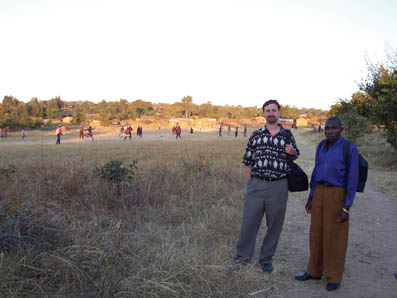|
|
 |
 |
|
ALUMNI UPDATESYou Had Me at “Hamjambo”: Martin Benjamin ’90Martin Benjamin ’90 seems sunny and relaxed, but don’t let that fool you. His calm conceals a passionate focus that he reveals only by degrees. Barefooted, and making himself as comfortable as the stone benches across from Lerner Hall can allow, he speaks about the work to which he’s devoted himself: a Swahili dictionary called The Kamusi Project (www.yale.edu/swahili). 

Martin Benjamin ’90 (left) with his research assistant, Lawrence Luboka, in a remote village in Tanzania. PHOTO: John F. Ho 
The Kamusi Project, under the aegis of Yale’s Council on African Studies, is a collaborative online Swahili dictionary, edited and contributed to by visitors from all around the world. Type “Kamusi” into the “translate” box at the top of the Web page, press “Look up” and you’ll see the word’s definition: “a reference resource containing an alphabetical list of words with information about them,” along with its Arabic root and a few sample sentences in English and Swahili. Currently, there are more than 70,000 entries. “It’s like Wikipedia … except we started six years earlier than Wikipedia,” Benjamin says, and notes at least one difference: For accuracy’s sake, “everything has to go through an editor” — namely, Benjamin. In 1994, Benjamin was an anthropology graduate student at Yale, preparing to travel to Africa. Swahili is the most widely spoken African language, with more than 50 million users in East and Central Africa, yet the tools available for learning it were hard to use. “I was using a dictionary,” Benjamin says, “and it was just awful. The way Swahili is organized, and the way the Swahili language works, you need to know what the stem is to be able to find the word in the dictionary. You need to have a fairly high level of knowledge. You can look up a word, and it says ‘go see under this word’ and then you look up that word and it says ‘go see under that other word’ and it would take you three or four minutes searching through the dictionary before you could get what you were looking for,” he says, his hands waving in exasperation. “And, when you found it, you would get a translation from a project from the 1930s that was an updating of a Bible translation project from the turn of the previous century that had been updated for colonial purposes that had no contemporary relevance.” He pauses for a breath. “And by that time you [would] have forgotten what you wanted to say,” Benjamin says with a laugh. Kamusi was never an easy project. The year that Benjamin started his dictionary, 1994, was still the Dark Age of the Internet. “There was no World Wide Web as we know it,” he says. “There was no practical Web browser.” (Netscape launched its first Web browser in December 1994.) Benjamin spent his Christmas vacation getting his idea off the ground. “I have distinct memories of typing in the first 3,000 words,” he says. At the time, though, he “had no idea this would consume … more than a decade of my life.” Still, Benjamin was motivated. Swahili was a tough language, but essential to his field work. “When I really started using it, I was by myself, in a village, and if I wanted to speak to anyone, I had to speak Swahili,” he says. Being able to hold a conversation was critical; an anthropologist must be able to speak to his or her subjects in their language if he or she wants them “to give you honest answers and tell you what’s on their minds or if you want to be able to disappear as a fly on the wall.” It took Benjamin four years of study and practical conversations at Yale and in Africa to learn the language. Benjamin’s dictionary has morphed from a graduate student’s noodling to a reference work of impressive size. As his graduate adviser, Dr. Ann Biersteker, told The Hartford Courant, “Both Martin and I thought [that Kamusi] would be used by academics and students. We were certainly not aware how many people … would use it, and the enthusiasm it would receive.” For example, the site receives about 10,000 unique visitors per week. The contributors, like the readers, come from all around the world —the United Kingdom, Kenya and Benin, for example. And Benjamin has begun collaborations with organizations such as One Laptop Per Child (www.laptop.org) to help spread Swahili’s accessibility. He also is working with Wikipedia’s WiktionaryZ, a project that will import data from Kamusi for its translating, multilingual dictionary. Benjamin has taught anthropology at Wesleyan and written for two of the Lonely Planet Swahili phrasebooks. This month, he is relocating to Switzerland, where his wife, Veronica Savu, has taken a post-doctoral research position at the École Polytechnique Federale de Lausanne. Still, he’ll be taking the project with him. He says that he needs to figure out whether he’s going to continue devoting most of his time to Kamusi or go back to Africa to work more specifically on anthropological projects and treat the dictionary as a sideline. Benjamin has received grants for the dictionary from the Negauni Foundation, a charitable group. A Columbia classmate, Warigia Bowman ’90, who started a safari company, Wildcats Safaris, with her husband, also helped fund Benjamin’s work. Sometimes other small grants trickle in. The money is tight — sometimes tight enough to shut down the project. But then again, Benjamin knows the work is important. “Every time we [Benjamin and three programmers] embark on a little project, it ends up being a lengthy diversion. So pretty much all my time is accounted for.” And if anyone doubts what he’s saying, the Kamusi Kam — filming dictionary edits live six hours a day from Benjamin’s office — can put their minds at ease. Rose Kernochan ’82 Barnard, Sana Saleh ’08
|
|
||||||||||||||||||||||||||||




